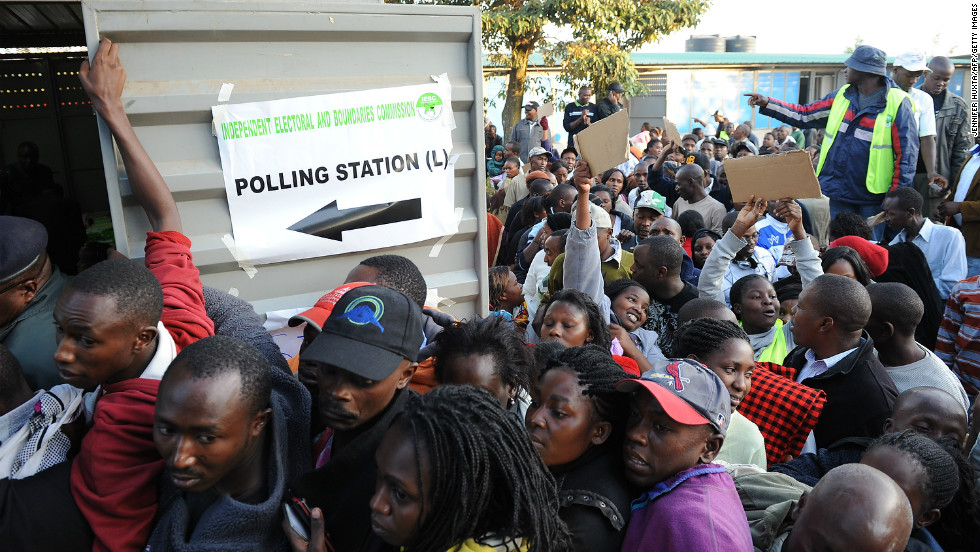As previously reported by
Open Source Investigations and various other international media outlets, the Kenyan election of 2017 was the perfect battleground for the deployment of new-media influence mechanisms on a national scale, via the use of data mining and data analysis processes, combined with strategic political communication. These efforts were employed by the British firm
Cambridge Analytica, as per their contract with the incumbent President of Kenya and the winner of these elections, Uhuru Kenyatta.
On the 10
th of May 2017, “
The Star” newspaper in Kenya reported that Kenyatta’s Jubilee Party had hired the British firm in order to help re-elect the President. A month later, the same newspaper announced that
Cambridge Analytica deployed an entire office in Nairobi – an office that was located on the seventh floor of the party’s headquarters and that was used as the forefront for all the operations the British firm were involved with in Kenya. The global privacy-protection charity
Privacy International suggests that the company has been paid well over
$6 million for its work.
One must ask himself what’s at work for $6 million – some might think that the British firm was employed as political consultants and that their entire work falls under the category of similar other companies that dwell in this particular line of business, while others are more cautious in their analysis, given
Cambridge Analytica’s past reputation of using psychometric profiling techniques in their campaigns.
The British firm had caught public attention after reportedly playing a huge role in both the US elections and the UK Brexit referendum, where it employed various mechanism to either conduct nation-wide polls on a magnitude never seen before, or collect data from hundreds of thousands of people, then bombard them with specifically targeted content in order to influence their opinion. To give you a perspective, Arron Banks, a millionaire that has backed the Leave.EU campaign last year – campaign that had ties with
Cambridge Analytica – said the following: “
We’ve hired Cambridge Analytica, an American company that uses big data and advanced psychographics to influence people” and “
Interesting, since we deployed this technology in Leave.EU we got unprecedented levels of engagement - 1 video 13 million views - AI won it for Leave”

The African nation of Kenya is currently leading Africa in internet penetration with over 30 million people having access to the internet, according to most recent reports. 67% per cent of the population is classified as internet users, or simply put two in every three Kenyans have access to the internet. What better place to employ the exact same services that
Cambridge Analytica does? Moreover, Kenya’s ruling government, under the leadership of President Kenyatta, already has nationwide voter information through the use of national Identity cards and mandatory cell-phone registration – which requires proof of both identity and residence.
All of the above wouldn’t necessarily pose a serious threat to countries in the West that have data protection laws set in place, but Kenya doesn’t have any whatsoever. This is the same reason why the British advocacy group “
Privacy International” (PI) criticized
Cambridge Analytica’s involvement with Kenyatta’s party, saying that it merits “
further scrutiny” in part because of the dangers of gathering data in a country where ethnic tensions continue to rise up exponentially. A data-mining operation on millions of Kenyans is highly problematic, especially since it’s unclear how such data will be stored and used and who exactly will have access to it after the campaign is over.
Claire Lauterbach, a PI researcher, had this to say regarding this subject:
„
Profiling allows anybody with access to enough personal data to learn highly intimate details about you, most of which you might have never decided to disclose in the first place. If Cambridge Analytica’s work in Kenya is just slightly similar to what we have learned about their work in the US and Europe, they will be creating a database of highly sensitive information about a considerable share of a country’s population”
Now that the Kenyan elections are over and Uhuru Kenyatta secured his second term, a look at the official results should make anyone question the insides of the campaign. The race between Kenyatta and Odinga was very close, with the latter getting 44.74% of the votes whilst the incumbent President obtained well over 54% of the total votes. The opposition party is already calling the results as fictitious and fake, calling for the country to go on a full strike against the Government. Many fear a repeat of the violence that followed the disputed 2007 election, when more than 1.100 Kenyans had died and 600.000 were displaced.

Although the final score of the election clearly puts Uhuru Kenyatta in the lead, the opposition, via the Presidential candidate Raila Odinga, has called for a recounting of the votes, saying that hacking had taken place in the electoral commission in order to doctor results from polling stations. Kura Yangu Sauti Yangu, a coalition of rights groups coordinated by the Kenya Human Rights Commission, has issued a statement saying that the voting process had been orderly across the entire country, but that the early results were “completely unverifiable”. Discrepancies between nationally induced figures and official written ones were present at over five polling stations – for example, in Nandi County, northwest of Kisumu, the local written tally had shown only 9 rejected votes, whilst the electoral commission had reported 439 in total. The two candidates were separated by nearly 1.4 million votes, with Kenyatta managing to score record numbers in previously opposition-lead counties – a surprise even for the most qualified political analyst out there. Foul play or better charisma?
Whilst we cannot argue about the legality of
Cambridge Analytica’s work – it clearly is legal – that cannot be said about the morality behind it all. This firm is clearly not in the political advising industry – it’s way over that. Data-collection at this level can not only change public opinion regarding various subjects, but it also can play a huge role in political campaigns, by targeting the most valorous, sought-after groups with data that is either fake or not, which in turn can lead to unexpected turnouts or even political “
miracles”, as seen in the last couple of years.
This very profitable field of work is slowly changing into something very scary, very fast. Data-collection and targeted political marketing verges on the brick of what is right and what is wrong, and nobody really realizes this. These firms, albeit acting in a legal matter, are nothing more but mercenaries, choosing to work for the highest bidder, regardless of who that is and what he has done in the past.
As long as there is no regulation set in stone, these political mercenaries will continue to roam the market, in search for their next profitable target. And the root of the problem stems from the very services these companies offer – data-collection. They no longer see an electorate formed of individual people, they only see data. They no longer see the human factor in all of this, they only see the numbers.
And as long as they don’t see people, they’ll be as ruthless as they have been in their actions.
 The African nation of Kenya is currently leading Africa in internet penetration with over 30 million people having access to the internet, according to most recent reports. 67% per cent of the population is classified as internet users, or simply put two in every three Kenyans have access to the internet. What better place to employ the exact same services that Cambridge Analytica does? Moreover, Kenya’s ruling government, under the leadership of President Kenyatta, already has nationwide voter information through the use of national Identity cards and mandatory cell-phone registration – which requires proof of both identity and residence.
All of the above wouldn’t necessarily pose a serious threat to countries in the West that have data protection laws set in place, but Kenya doesn’t have any whatsoever. This is the same reason why the British advocacy group “Privacy International” (PI) criticized Cambridge Analytica’s involvement with Kenyatta’s party, saying that it merits “further scrutiny” in part because of the dangers of gathering data in a country where ethnic tensions continue to rise up exponentially. A data-mining operation on millions of Kenyans is highly problematic, especially since it’s unclear how such data will be stored and used and who exactly will have access to it after the campaign is over.
Claire Lauterbach, a PI researcher, had this to say regarding this subject:
„Profiling allows anybody with access to enough personal data to learn highly intimate details about you, most of which you might have never decided to disclose in the first place. If Cambridge Analytica’s work in Kenya is just slightly similar to what we have learned about their work in the US and Europe, they will be creating a database of highly sensitive information about a considerable share of a country’s population”
Now that the Kenyan elections are over and Uhuru Kenyatta secured his second term, a look at the official results should make anyone question the insides of the campaign. The race between Kenyatta and Odinga was very close, with the latter getting 44.74% of the votes whilst the incumbent President obtained well over 54% of the total votes. The opposition party is already calling the results as fictitious and fake, calling for the country to go on a full strike against the Government. Many fear a repeat of the violence that followed the disputed 2007 election, when more than 1.100 Kenyans had died and 600.000 were displaced.
The African nation of Kenya is currently leading Africa in internet penetration with over 30 million people having access to the internet, according to most recent reports. 67% per cent of the population is classified as internet users, or simply put two in every three Kenyans have access to the internet. What better place to employ the exact same services that Cambridge Analytica does? Moreover, Kenya’s ruling government, under the leadership of President Kenyatta, already has nationwide voter information through the use of national Identity cards and mandatory cell-phone registration – which requires proof of both identity and residence.
All of the above wouldn’t necessarily pose a serious threat to countries in the West that have data protection laws set in place, but Kenya doesn’t have any whatsoever. This is the same reason why the British advocacy group “Privacy International” (PI) criticized Cambridge Analytica’s involvement with Kenyatta’s party, saying that it merits “further scrutiny” in part because of the dangers of gathering data in a country where ethnic tensions continue to rise up exponentially. A data-mining operation on millions of Kenyans is highly problematic, especially since it’s unclear how such data will be stored and used and who exactly will have access to it after the campaign is over.
Claire Lauterbach, a PI researcher, had this to say regarding this subject:
„Profiling allows anybody with access to enough personal data to learn highly intimate details about you, most of which you might have never decided to disclose in the first place. If Cambridge Analytica’s work in Kenya is just slightly similar to what we have learned about their work in the US and Europe, they will be creating a database of highly sensitive information about a considerable share of a country’s population”
Now that the Kenyan elections are over and Uhuru Kenyatta secured his second term, a look at the official results should make anyone question the insides of the campaign. The race between Kenyatta and Odinga was very close, with the latter getting 44.74% of the votes whilst the incumbent President obtained well over 54% of the total votes. The opposition party is already calling the results as fictitious and fake, calling for the country to go on a full strike against the Government. Many fear a repeat of the violence that followed the disputed 2007 election, when more than 1.100 Kenyans had died and 600.000 were displaced.
 Although the final score of the election clearly puts Uhuru Kenyatta in the lead, the opposition, via the Presidential candidate Raila Odinga, has called for a recounting of the votes, saying that hacking had taken place in the electoral commission in order to doctor results from polling stations. Kura Yangu Sauti Yangu, a coalition of rights groups coordinated by the Kenya Human Rights Commission, has issued a statement saying that the voting process had been orderly across the entire country, but that the early results were “completely unverifiable”. Discrepancies between nationally induced figures and official written ones were present at over five polling stations – for example, in Nandi County, northwest of Kisumu, the local written tally had shown only 9 rejected votes, whilst the electoral commission had reported 439 in total. The two candidates were separated by nearly 1.4 million votes, with Kenyatta managing to score record numbers in previously opposition-lead counties – a surprise even for the most qualified political analyst out there. Foul play or better charisma?
Whilst we cannot argue about the legality of Cambridge Analytica’s work – it clearly is legal – that cannot be said about the morality behind it all. This firm is clearly not in the political advising industry – it’s way over that. Data-collection at this level can not only change public opinion regarding various subjects, but it also can play a huge role in political campaigns, by targeting the most valorous, sought-after groups with data that is either fake or not, which in turn can lead to unexpected turnouts or even political “miracles”, as seen in the last couple of years.
This very profitable field of work is slowly changing into something very scary, very fast. Data-collection and targeted political marketing verges on the brick of what is right and what is wrong, and nobody really realizes this. These firms, albeit acting in a legal matter, are nothing more but mercenaries, choosing to work for the highest bidder, regardless of who that is and what he has done in the past.
As long as there is no regulation set in stone, these political mercenaries will continue to roam the market, in search for their next profitable target. And the root of the problem stems from the very services these companies offer – data-collection. They no longer see an electorate formed of individual people, they only see data. They no longer see the human factor in all of this, they only see the numbers.
And as long as they don’t see people, they’ll be as ruthless as they have been in their actions.
Although the final score of the election clearly puts Uhuru Kenyatta in the lead, the opposition, via the Presidential candidate Raila Odinga, has called for a recounting of the votes, saying that hacking had taken place in the electoral commission in order to doctor results from polling stations. Kura Yangu Sauti Yangu, a coalition of rights groups coordinated by the Kenya Human Rights Commission, has issued a statement saying that the voting process had been orderly across the entire country, but that the early results were “completely unverifiable”. Discrepancies between nationally induced figures and official written ones were present at over five polling stations – for example, in Nandi County, northwest of Kisumu, the local written tally had shown only 9 rejected votes, whilst the electoral commission had reported 439 in total. The two candidates were separated by nearly 1.4 million votes, with Kenyatta managing to score record numbers in previously opposition-lead counties – a surprise even for the most qualified political analyst out there. Foul play or better charisma?
Whilst we cannot argue about the legality of Cambridge Analytica’s work – it clearly is legal – that cannot be said about the morality behind it all. This firm is clearly not in the political advising industry – it’s way over that. Data-collection at this level can not only change public opinion regarding various subjects, but it also can play a huge role in political campaigns, by targeting the most valorous, sought-after groups with data that is either fake or not, which in turn can lead to unexpected turnouts or even political “miracles”, as seen in the last couple of years.
This very profitable field of work is slowly changing into something very scary, very fast. Data-collection and targeted political marketing verges on the brick of what is right and what is wrong, and nobody really realizes this. These firms, albeit acting in a legal matter, are nothing more but mercenaries, choosing to work for the highest bidder, regardless of who that is and what he has done in the past.
As long as there is no regulation set in stone, these political mercenaries will continue to roam the market, in search for their next profitable target. And the root of the problem stems from the very services these companies offer – data-collection. They no longer see an electorate formed of individual people, they only see data. They no longer see the human factor in all of this, they only see the numbers.
And as long as they don’t see people, they’ll be as ruthless as they have been in their actions.










Trackbacks and Pingbacks